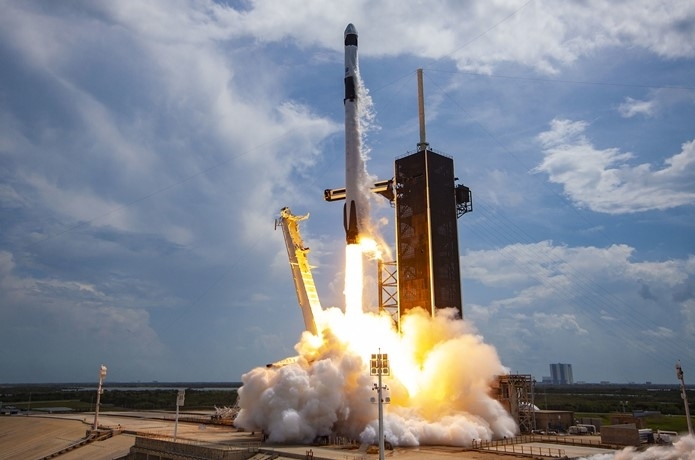We are entering a new era of space exploration driven by private space launch companies, advances in launch technology, and the rise of the commercial space economy. Aerospace titans like SpaceX and Blue Origin are revolutionizing access to space with innovative reusable rockets. Meanwhile, emerging launch providers, including space launch companies, bring fresh ideas for cost-effective and flexible launch services to propel the growth of the commercial space sector further.
Advances in Space Launch Technology
The commercial space industry is pioneering next-generation launch vehicles and reusable rocket technology to dramatically lower launch costs. SpaceX’s Falcon 9 and Falcon Heavy rockets represent leaps in performance and reusability, while Blue Origin’s New Glenn aims to disrupt heavy-lift launch markets. Small launch vehicles from Rocket Lab, Relativity Space, and others also promise flexible, affordable access to orbit.
The Rise of the New Space Economy
The success of commercial launch providers is fueling growth in the new space economy. As launch costs decline, opportunities for satellite broadband, space-based sensing, space tourism, space mining, and orbital manufacturing expand. Morgan Stanley estimates the global space industry revenue could grow to over $1 trillion by 2040.
Titans of the Aerospace Industry
Leading aerospace industry giants are playing a pivotal role in this new era of exploration. Incumbents like United Launch Alliance provide reliable rideshare and mission management services. Defense contractors bring engineering expertise for complex space systems. Meanwhile, disruptive startups are redefining launch vehicle economics.
Leading Aerospace Industry Players
From household names like SpaceX, Blue Origin, Rocket Lab, Northrop Grumman, and Lockheed Martin to lesser-known innovators, companies across the size and experience spectrum are driving advances. Their talented engineers and leaders envision democratizing access to space for all sectors. Partnerships across public and private entities provide the foundation for progress.
Revolutionizing Commercial Spaceflight
Private spaceflight companies SpaceX, Blue Origin, Virgin Galactic, and others aim to drastically lower launch costs and fulfill the dream of affordable space travel. Founded by visionaries Elon Musk, Jeff Bezos, and Sir Richard Branson, respectively, these companies have invested billions into cutting-edge launch vehicles, spacecraft, and spaceports for orbital and suborbital launches.
Top Space Launch Companies
Today’s top dedicated small launch providers include Rocket Lab, Virgin Orbit, and ABL Space Systems. Meanwhile, SpaceX and United Launch Alliance dominate medium-to-heavy lift markets. Blue Origin and Firefly Aerospace are emerging challengers for small and medium launches. This landscape may evolve swiftly as innovators prove their capabilities and reliability.
Innovations in Rocket Launch Services
New and established launch providers embrace cost-saving innovations like rocket reusability, 3D printing, methane-fueled engines, autonomous flight termination systems, and mobile launch platforms. These innovations promise rapid launch turnaround times, payload flexibility, and responsive capability for diverse customer needs in the civil, defense, and commercial space sectors.
The Pioneers of Private Space Companies
Billionaires Elon Musk, Jeff Bezos, and Sir Richard Branson pioneered the commercial space industry and made space exploration their life mission. Each invested their fortunes into SpaceX, Blue Origin, and Virgin Galactic, leading a wave of private investment into the space sector. Today, over 200 venture-backed space startups promise to expand access and opportunity on the planet.
Expanding Horizons: Orbital and Interplanetary Missions
As launch technology advances, orbital missions provide platforms for communications, imagery, space tourism, and scientific research. By mastering cost-effective and high-flight-rate launches, the industry puts itself in a position to achieve the most ambitious goal – transporting humans to Mars.
Satellite Deployment and Space Launch Systems
Satellite manufacturers rely on stable, reliable, and cost-competitive launch services to safely and accurately deploy spacecraft assets that fuel space-based economics. Continued innovations around vehicles, autonomous systems, reusable elements, and responsive solutions give flexibility for diverse satellite deployment needs.
The Evolution of Spacecraft Manufacturing
Blue-chip contractors and disruptive startups bring materials science, avionics, and software advancements to manufacture resilient, capable, and affordable spacecraft. Partners specialize across spacecraft subsystems and integrate to meet mission requirements. The industry is evolving towards smart modular designs for manufacturing efficiency.
Space Tourism: A New Frontier
Private space companies are ushering in a new era of space tourism for suborbital and orbital flights. Richard Branson’s Virgin Galactic and Jeff Bezos’ Blue Origin have crewed suborbital vehicles today, with orbital flights planned this decade. Opportunities for the average person to experience viewing Earth from space are closer than ever before.
Low Earth Orbit (LEO) and Beyond
As launch costs decrease sharply, economic activity in LEO and beyond grows possible. Beyond communication satellites, future ambitions target space hotels, manufacturing facilities, energy generation, astronomy, and human habitats. Achieving a steady cadence of launches is a critical first step to enable this future.
Investment and Market Analysis in the Space Sector
Billionaire entrepreneurs catalyzed investment interest, with space startups receiving $7.7 billion in 2021 funding across 192 deals. Launch activity generates further revenue, with overall launch services markets estimated to grow from $11.4 billion in 2019 to $32.4 billion by 2027. Declining costs spur new applications on orbit.
Regulatory and Environmental Considerations
As launch rates increase exponentially, policies and processes evolve to enable safe and environmentally responsible growth. Launch providers progress sustainability efforts as participants target airline-like operations. Meanwhile, regulators balance optimizing barriers to launch while ensuring public safety and managing congestion as spacecraft transit routes get busier.
Space Transportation: Today and Tomorrow
In the near term, technical improvements around responsiveness, reusability, and flight rate promise more flexible and affordable launch solutions. Long-term, fully reusable vehicles and spaceports connected across transport modes could achieve hypersonic point-to-point travel anywhere on Earth in under an hour.
Conclusion: The Future of Space Exploration
The rapid growth, bold vision, and meaningful advances across private space enterprises signal a new era for space exploration is underway – one whose horizons stretch far broader than we can imagine today. The most profound discoveries from unlocking commercial access to space may still be years or decades ahead of us.

